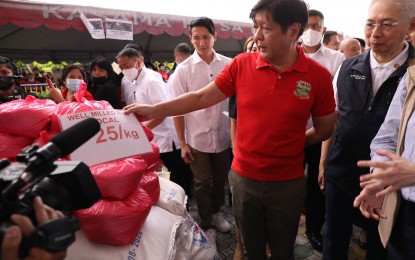
President Ferdinand R. Marcos Jr. said Thursday the Kadiwa ng Pasko project will continue even beyond the Christmas season, noting the importance of offering more affordable products to Filipino consumers.
At the recent Kadiwa ng Pasko caravan in Quezon City, Marcos sought tie-ups with local government units (LGUs) to ensure the success of the project. “The Office of the President and the LGUs will work together to spread more Kadiwa stores. We will continue the project,” he said.
An initiative of the Office of the President and spearheaded by the Department of Agriculture, the Kadiwa ng Pasko project was formally launched on November 16 to promote affordable and high-quality products direct to consumers, and provide a market to local agricultural producers as well as micro, small and medium enterprises (MSMEs).
The President said the Kadiwa ng Pasko program, that enables the government to offer cheaper rice at P25 per kilo only, is his administration’s “good” Christmas gift to the Filipino people. “I think it is a good Christmas gift and I hope it keeps on giving. And that is what we have been working towards,” he added.
Marcos also expressed gratitude to the Kadiwa caravan partners and participants, including the Quezon City LGU which serves as the government model in the implementation of the project. “Thanks to you all for your participation. We are helping each other. We need to help each other and find a way to reach our goal),” he said.
The Chief Executive also expressed his hope to stabilize the prices of basic commodities in the local markets by the first quarter of 2023. He said the purpose of the Kadiwa project will change once the prices in the markets become “the same as what we can give in the Kadiwa [caravan].”
The Kadiwa ng Pasko project was launched to address inflation and price surges associated with the Christmas season. It provides a direct farm-to-consumer food supply chain to eliminate several marketing layers and help boost the income of local agricultural producers.
The caravan is being implemented in partnership with the Departments of Trade and Industry (DTI), Interior and Local Government DILG), Labor and Employment (DOLE), and Social Welfare and Development (DSWD).